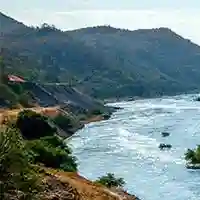The receding water levels in the Zambezi River, which separates Zambia and Zimbabwe, have led to a surge in the number of people illegally crossing the border between the two neighbouring countries, according to Morgan Moyo, the Acting Immigration Regional Manager.
Moyo revealed this development during a recent visit by a delegation from the Parliamentary Portfolio Committee on Industry and Commerce to the Chirundu One-Stop Border Post.
The reduced water volume in the Zambezi River is a consequence of the El Niño weather pattern, which negatively impacted the 2023/24 rainy season, resulting in very low rainfall.
Typically, the crocodile-infested Zambezi River, when in flood, acts as a deterrent, helping to reduce cases of illegal border crossings.
However, the current low water levels have made the river less of a barrier, enabling more people to enter and leave the country through various illegal crossing points along the river and within the national park.
Moyo acknowledged that the border has become more porous, with individuals now able to move freely between Zambia and Zimbabwe without going through the official border crossing points.
This development has raised concerns about the potential for increased illegal activities, such as smuggling and human trafficking, as well as the risk of the spread of communicable diseases and the loss of tax revenue. Said Moyo (via NewZimbabwe.com):
We used to be proud of our river, the Zambezi, it used to be always full and infested with crocodiles and was a deterrent enough to stop illegal crossing.
But as we are talking right now, the water has receded to levels that you have never seen before. People can now cross easily along any part of the Zambezi.
What that means is, all those illegal entrants are now taking advantage, and we cannot even monitor that because some crossing points are within the national park.
Chirundu One-Stop Border Post is situated within a national park and what it means is that we cannot do land patrols in a national park lest we will be confused for poachers.
Moyo said the Zimbabwe National Parks and Wildlife Authority (ZimParks) management has pledged additional rangers to patrol the border and use drones to help spot border jumpers.
More: Pindula News

